| Srl | Item |
| 1 |
ID:
124296
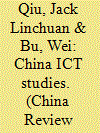

|
|
|
|
|
| Publication |
2013.
|
| Summary/Abstract |
This article presents an overview of 1705 academic publications on Internet and ICTs (information and communication technologies) in China, published from 1989 to 2012, in Chinese and English. The Chinese entries include 1204articles from four top journalism and communication studies journals published in Beijing and Shanghai (i.e., those in the J&C database). The English publications are drawn from the Chinese Internet Research Bibliography (i.e., CIR Bibliography)
|
|
|
|
|
|
|
|
|
|
|
|
|
|
|
|
| 2 |
ID:
091493
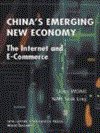

|
|
|
|
|
| Publication |
Singapore, Singapore University press, 2001.
|
| Description |
vii, 142p.
|
| Standard Number |
9810244959
|
|
|
|
|
|
|
|
|
|
|
|
Copies: C:1/I:0,R:0,Q:0
Circulation
| Accession# | Call# | Current Location | Status | Policy | Location |
| 054454 | 658.840951/WON 054454 | Main | On Shelf | General | |
|
|
|
|
| 3 |
ID:
133733
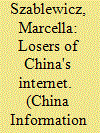

|
|
|
|
|
| Publication |
2014.
|
| Summary/Abstract |
Diaosi (??) ranked as one of the most popular Internet memes of 2012, and it continues to be popular to this day. This article analyses the origins and nature of the diaosi meme and the young men (and women) who self-mockingly describe themselves as 'losers'. The meme has led to ample speculation in the media and among Chinese academics, and while some see the meme as a relevant form of political critique, others dismiss it as indicative of a psychological malaise affecting contemporary youth. This article reviews the state of this debate about the meanings of the diaosi phenomenon, while offering a new interpretation that frames the meme in terms of Raymond Williams's notion of 'structures of feeling'. Though diaosi is a seemingly humorous and playful Internet meme, it is also one that signals young netizens' disillusionment with the apparent lack of possibilities for upward socio-economic mobility in contemporary China. This author contends that the diaosi phenomenon, though amorphous and at times contradictory, may also be considered an emergent form of affective identification through which alternative desires and forms of mobility may be imagined and enacted.
|
|
|
|
|
|
|
|
|
|
|
|
|
|
|
|
| 4 |
ID:
076678
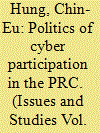

|
|
|
| 5 |
ID:
133734
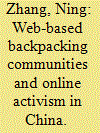

|
|
|
|
|
| Publication |
2014.
|
| Summary/Abstract |
This article examines activism that has emerged in online communities. This ethnographic study of two web-based backpacking communities shows that citizens and activists use the Internet mainly for forming communities, sharing information, instilling democratic values and solving immediate social problems. They do not call for cyberwar, acts of hacktivism or other sorts of offensive online and offline actions, but seek to bring social justice and improve well-being within their sphere of influence. The dynamics of this new online activism and its significance for the development of associational life and civil society in China are explored in this article.
|
|
|
|
|
|
|
|
|
|
|
|
|
|
|
|